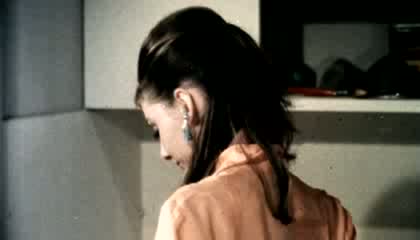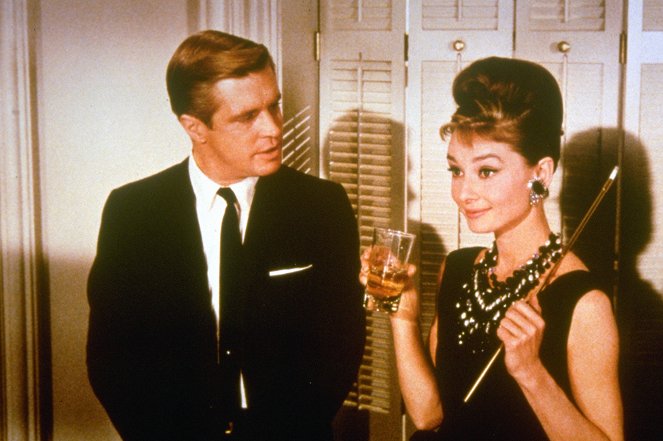Regie:
Blake EdwardsDrehbuch:
George AxelrodMusik:
Henry ManciniBesetzung:
Audrey Hepburn, George Peppard, Patricia Neal, Buddy Ebsen, Martin Balsam, José Luis de Vilallonga, John McGiver, Stanley Adams, Elvia Allman, Alan Reed (mehr)Streaming (4)
Inhalte(1)
In New York lebt Holly in den Tag hinein und lässt sich ihren aufwändigen Lebensstil durch reiche Verehrer finanzieren. Doch dann verliebt sie sich in einen mittellosen Schriftsteller.
Holly Golightly (Audrey Hepburn), ein freches, aber liebenswertes Callgirl, verbringt ihre New Yorker Nächte mit Partys und reichen Männern. Ihr liebster Ort in der Millionenstadt ist vor dem Schaufenster des Nobel-Juweliers Tiffany. Nach einer durchfeierten Nacht schlendert sie dort gern zum Frühstücken vorbei. Hollys neuer Nachbar, der Schriftsteller Paul Varjak (George Peppard), ist fasziniert von der stilbewussten jungen Frau. Bald verbindet die beiden eine enge Freundschaft. Als eines Tages Hollys Ex-Ehemann vor der Tür steht, erfährt Paul mehr über Hollys Vergangenheit und ihre ärmliche Herkunft. Paul fühlt sich immer mehr zu Holly hingezogen. Doch sie verfolgt weiterhin den Plan, einen reichen Mann zu heiraten. Ein einflussreicher brasilianischer Großgrundbesitzer scheint der Richtige zu sein. Kurz vor der Abreise nach Rio de Janeiro wird Holly festgenommen und muss eine Nacht im Gefängnis verbringen. Die Polizei behauptet, sie stünde in Verbindung mit einem stadtbekannten Gangsterboss. Tatsächlich hat das naive Party-Girl diesen wöchentlich besucht und ihm verschlüsselte Nachrichten überbracht. Die Hochzeit mit dem Brasilianer platzt, und Holly muss sich entscheiden, wie sie ihr Leben fortführen möchte.
(ZDF)
Videos (1)
Kritiken (8)
Dieses Werk hat wirklich Glück, dass es 1961 gedreht wurde und die Chance bekam, fast ein Hollywood-Kultfilm zu werden. Leider ist es aus meiner Sicht ein ziemlich schwacher Trash, dessen Länge langsam unerträglich wird. Für den Film hätte maximal eine Stunde völlig ausgereicht. Das gilt auch für eine flache Audrey Hepburn in einigen Passagen, die kaum glaubhaft war. Der Film spielt etwas vor, was er nicht ist. Er hat nur einen Charme, und das sind die Zeit und der Ort, an dem er gedreht wurde.
()
Die Verfilmung von "Frühstück bei Tiffany" ist mit bestimmten Erwartungen verbunden. Die Legende spricht von Audrey Hepburn, angeblich die ideale Modeikone, und natürlich von Tiffany-Schmuck. Aber zum Glück gibt es noch etwas Wichtigeres. Truman Capote, dessen Text von 1958, wie sich zeigte, unsterblich ist. Im Gegensatz zu dieser freien Verfilmung, die nicht gelungen ist. Ich gebe zu, dass die kurze Szene des Incognito-Rendezvous zwischen Holly und Paul durchaus etwas an sich hatte (vor allem die Zerstörung des Vermögens der New York Public Library), aber man kann nicht einen ganzen Film auf dieser einen Idee aufbauen. Alles ist unnatürlich, alles ist künstlich wie die falschen Strähnchen, die Audrey in diesem unerträglichen Dutt trägt. Der Höhepunkt des Sixties-Kitsches ist natürlich die Partyszene, die so typisch für das Chaos vieler anderer Blake-Edwards-Filme ist. Aber zum Glück für alle, die Capote verehren, wird es immer die Radioversion mit Hana Maciuchová und Jiří Adamíra geben, die, obwohl sie 1991 nur in einem Studio in Dejvice eingepfercht waren, mehr zustande brachten als die gesamte berühmte Hollywood-Produktion. Es macht einfach keinen Sinn, die Geschichte von 1943 an einem anderen Ort spielen zu lassen.
()
Everyone should see this gem! Audrey Hepburn has always struck me as a lady with everything that goes with it. She's the reason this film has no shortage of wit, originality, and romance. If there's one thing that's got pizzazz, it's this. The final scene in the rain, when Audrey is running and shouting "Cat, cat, caaaat..." is legendary. I love the music, the interiors, the elegant fashion, the haircuts, the gloves... I love Tiffany! And George Peppard is a real man. Breakfast at Tiffany's is one of my all-time favorites.
()
After watching this movie I realized how hard modern romantic movies have it. Then, all it took was one smile of Audrey Hepburn and you were on your way to the movie of the year. Nowadays, the more original the movie with a punchline larger than Beverly Hills, the fewer reasons we have to immediately forget it. But here, I enjoyed more Audreyʼs cat than Audrey herself and since she acted like a douche towards it near the end of the movie, I give Breakfast at Tiffanyʼs three stars.
()
Breakfast at Tiffany’s embodies Hollywood at its most classic and at its worst. On the one hand, we have here the magnificently stellar Audrey Hepburn, a narrative with bittersweet tones and precision craftsmanship. On the other hand, there is the absolutely horribly kitschy ending that utterly negates everything that has gone before. All of the potential depth and ambiguity of not only the central character, but also of the whole depiction of the emptiness and artificiality of the American Cinderella story is bluntly trampled underfoot. At its core, or rather in the book on which it’s based, Breakfast at Tiffany’s is actually a precursor to Soderbergh’s The Girlfriend Experience, which the film version could also have been, up until that off-key climax. Only instead of the sense of detachment and cynicism of modern cinema, the bitterness and self-pity of consumer fairy tales shine through the cracks in the superficial carefreeness and the distracted life of the endless party. With a bit of tolerance and a great deal of sympathy, mainly for the iconic Audrey Hepburn, it’s possible to squint at the film and excuse its betrayal of the viewer in the same way that Mickey Rooney’s much-criticised part deservedly did, which unfortunately was the normal or rather dominant way of going about things at that time. Hollywood was overtly racist then, grinding down the edges of everything that stood out, returning distinctive and headstrong female characters, who were largely ground down themselves, into the arms of the masculine hero and delivering false illusions instead of inspiring catharsis.
()



Werbung